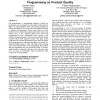50 search results - page 5 / 10 » How Reliable Are Systematic Reviews in Empirical Software En... |
ICFEM
2009
Springer
14 years 2 days ago
2009
Springer
Structural constraint solving allows finding object graphs that satisfy given constraints, thereby enabling software reliability tasks, such as systematic testing and error recove...
SIGSOFT
2004
ACM
14 years 8 months ago
2004
ACM
Defect-occurrence projection is necessary for the development of methods to mitigate the risks of software defect occurrences. In this paper, we examine user-reported software def...
COMPSAC
2004
IEEE
13 years 11 months ago
2004
IEEE
Software reliability is defined as the probability of failure-free software operation for a specified period of time in a specified environment. Over the past 30 years, many softw...
ICSE
2005
IEEE-ACM
14 years 7 months ago
2005
IEEE-ACM
Pair programming is a programming technique in which two programmers use one computer to work together on the same task. There is an ongoing debate over the value of pair programm...
AC
2002
Springer
13 years 7 months ago
2002
Springer
How much does the choice of a programming language influence the prevalence of bugs in the resulting code? It seems obvious that at the level at which individuals write new progra...

